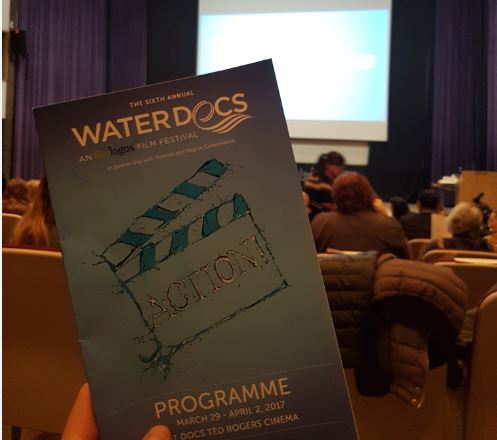RiverBlue. An eye opening documentary that places awareness on how our jeans create a much larger environmental and health issue than we know. Did you know that the darker the dye, the longer it takes to decompose, darkens waters leaving plants (including our crop) to be short on sun and oxygen? (via: Popular Science) In short, we are consuming chemical dyes (which btw, only 16 of 1,600 dye chemicals are approved safe for the environmental/human health – pp. 32, Betts M., 2007) and making the less than 1% of drinkable water more polluted.

WaterDocs Film Festival – Time to Take Action!
As with the majority of environmental issues, it always lead to comments such as: “it’s halfway around the world” and “what can I do about it anyways?!” Re-iterated answer based on the concept of consumerism and found repeated in the film: You, as the consumer, control where your money goes. You vote with your money.
There are several key players in leading change: the local government who regulates the laws; the corporations who controls the money, location and who they would like to purchase from; and the consumer who provides the money to these corporations/companies by choosing to buy from them.
It all comes down to money (not the first or last time you’ll hear this). Here’s the equation:
Low costs to make a product…
= Cutting costs/corners (i.e.) environmentally, “ingredients”, social/human rights)…
= Increase in profit due to higher potential markups…
= Low costs for consumers …
= Greater demand (becoming blind sighted to the actual costs of our choices (True Cost documentary) ….
= Greater stress and demand…
= Cutting costs/corners to meet demand…
—->The circle un-sustainably continues <—-

Panel of Speakers (R to L): Adria Vasil (Moderator), Kelly Drennan (Fashion Takes Action), Lisa Mazzotta & Roger Williams (Filmmakers), Kelly Okamura (gooderGoods), Elizabeth Hendricks (WWF Canada)
Innovation is there. We just need to learn and adapt it. Processes are meant to continuously change and its best to do it with minimal harm to those and the environment that aid in making the product. One company and the first textile business, Canepa, uses exoskeletons of shellfish (Crustaceans) instead of chemicals in the process of apparel making working alongside of Greenpeace Detox Program.
For those ready for change or just curious to see some (not all) areas to start:
– Ethical Fashion Forum
– Fashion Takes Action.
– EcoCult
– The Good Trade
It won’t be cheap but for those in an affluent country, lets spend it with a little more thought in what we are really investing in.
To Ponder On: How do you justify a mass produced $5 tshirt is worth buying? Yes – it gives someone a low wage but most likely a shorter life span/problematic health concerns. What happened to caring about quality?
Photosource: Business Insider


